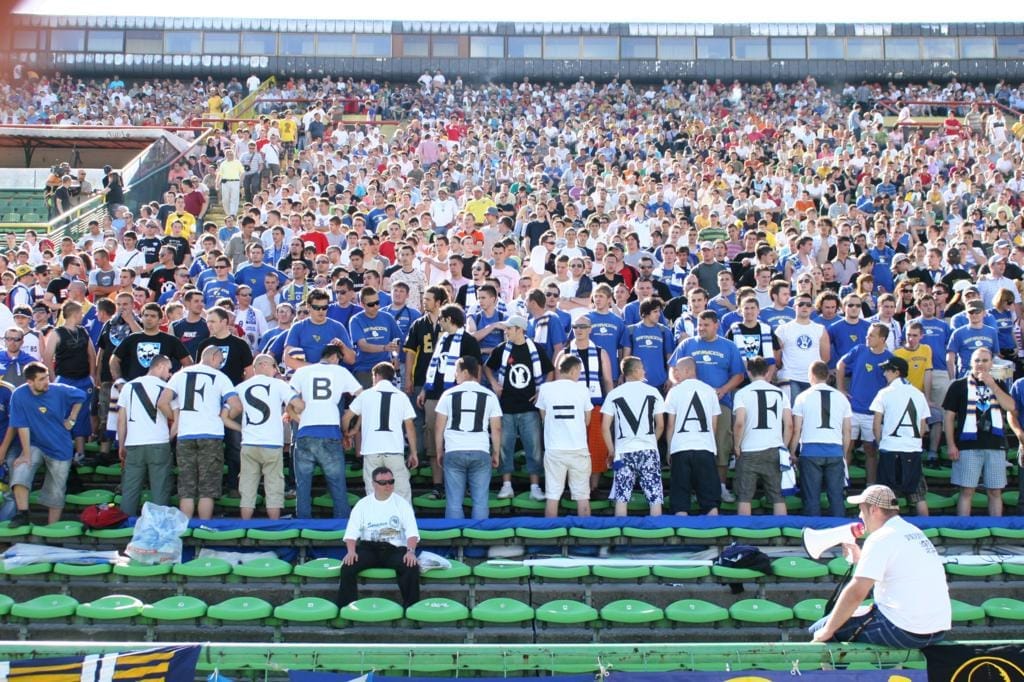Fans, players, reporters, heads of clubs and football referees who criticize or get in the way of the management of the Football Association of Bosnia and Herzegovina (BiH) are subject to tremendous pressures. Some have been suspended or fired, and many have received threatening phone calls.
Veteran sports journalist Vahidin ‘Vaha’ Alihodžić said that after he criticized the BiH Football Association on his Kalman radio show in 2005, he received phone threats against himself and his family.
‘I was forced to take my wife and children to another location for a period of time, because the threats were really heinous’ said Alihodzić. ‘However, luckily nothing bad happened.’
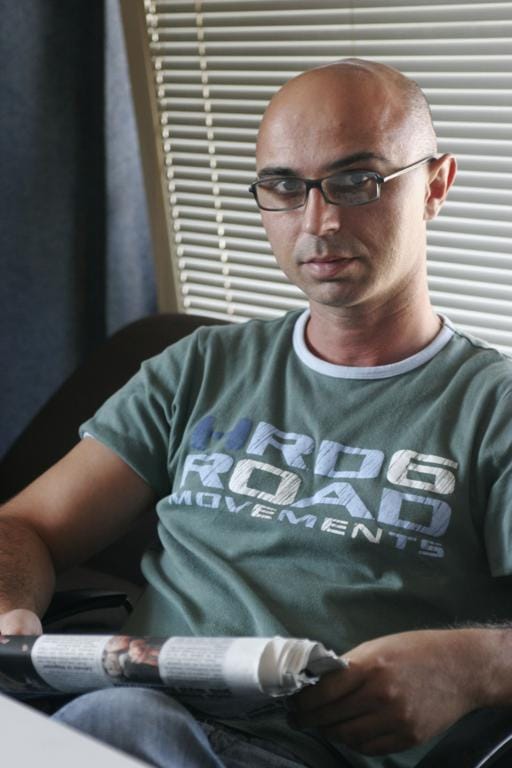
Alihodžić said he didn’t expect such a vicious response because his biggest criticism was that BiH football leadership did not include anyone who had been a top player, or anyone with a strong sports profile, as do the associations of other former Yugoslav countries. According to him, because of their unfamiliarity with the game, they can’t improve the national team or Premier league football. His criticism also included not inviting some quality players to the national team, and the failure to groom young players who, he said, should be the future of BiH football.
Enes Kršo, who owned the Kalman station at the time, said he also received death threats. In one, an anonymous caller asked him why his journalist (Alihodžić) brought up the name of Munib Ušanović, the secretary general of the association. Kršo said he told the caller he should ask Alihodžić, and heard, ‘Well, it is you I’m asking. Should I ask Vahidin, I’ll kill both you and him, anyway.’
A Scene from a Movie
Krso said he felt most threatened when he was surrounded near the Holiday Inn in Sarajevo by five flashy cars, from which emerged men who began to demand that he change the way Kalman radio reported on sport events .
‘Just like in the movies. They only lacked masks and automatic weaponry’ Kršo said, and added that he was so scared he forgot to write down their license plates as they drove away.
‘I backed up Vaha. That was my duty, as I’m the head of that radio station. If anyone has something else in mind, there’s a court and they are free to sue us.’
According to Ušanović, Alihodžić aired more flawed information about the association than all other media outlets together, but he was unaware of the threats.
‘That’s absurd. That’s outrageous. I don’t support that, of course. That is the utmost stupidity and I don’t support it’ said Ušanović.
Ušanović denies it, but Alihodžić said that he guessed from the content of the threats that they were made under the direction or suggestion of someone at the football association.
‘Let’s make one thing clear. Of course, none of them did it. They are not so naïve. They are brazen, but not naïve. They have tried to threaten me with some thugs. I did what I had to and I’m still working’said Alihodžić.
Ušanović said that he has never directly contacted Alihodžić or Kršo, but it was possible someone acted without his knowledge.
Alihodžić is not the only reporter who had problems after criticizing the association.
After Belgium and BiH met in Brussels on March 26, 2005 as part of a series of qualifying matches for the World Cup in 2006, a group of sports reporters told the Association of ”BH Journalists” that they had been threatened because of their comments.
People who identified themselves as ‘friends of the Football Association’ sent them several threatening cell phone messages. One read: ‘The night might swallow you if you continue writing about individuals from the Football Association.’ The ‘BH Journalists’ an organization that, among other things, tries to protect BiH journalists, put out a press release, saying this was not the first time that there had been attempts to scare reporters out of writing about the association, whether on the dealings of its officials or the dismal record of the national team.
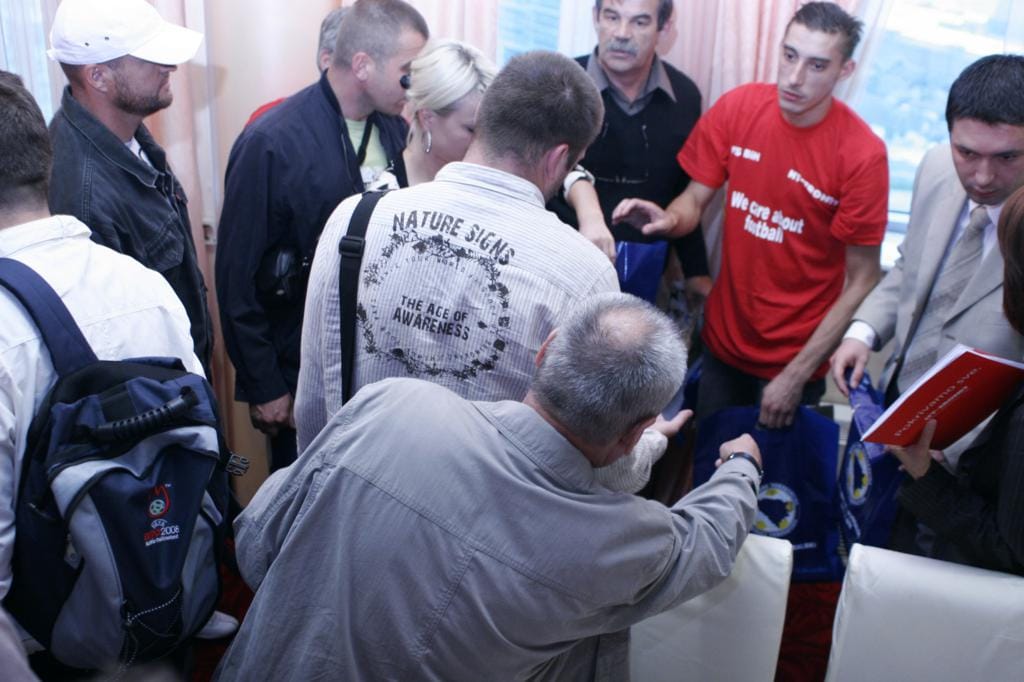
Referees have learned to expect trouble if they speak out. Midhat Čorbo said he was removed from a list of Premier League referees in July 2004 after talking about the practice among some referees of paying to get game assignments. He said he was also subjected to anonymous phone threats and pressures.
‘I was told I’d be killed, to stop talking, that my house would be set on fire and children killed and so on’ he said.
Another referee who had been taken off the list of refrees’ assistants criticized the leadership of the association to the media, Dževad Imočanin.
But if journalists and referees get assailed for their criticism, so do some fans.
The BH Fanaticos, made up largely of Bosnians living abroad, is unsatisfied with the association for reasons similar to Alihodžić’s.
Changing from Fans to Harsh Critics
Despite its strong support of the national team through over a number of years, the Fanaticos started to openly oppose the association’s leadership after the 2006 match between Belgium and BiH. Members told reporters for the Center for Investigative Reporting in Sarajevo (CIN) that before the game Ušanović seemed to discourage attendance, telling them no tickets were available.
But more than 10,000 fans of BiH showed up and all bought tickets without problems, they said. They said because they felt Ušanović had tried to talk them out of attending, they began to question the association’s leadership.
Ušanović said that he never called on fans not to go to Belgium and that the expat Fanaticos lack a realistic perspective on the association. He said it cannot legally and in an orderly manner take BiH fans to games abroad because there is no brawling prevention acts for sporting events at the state level.
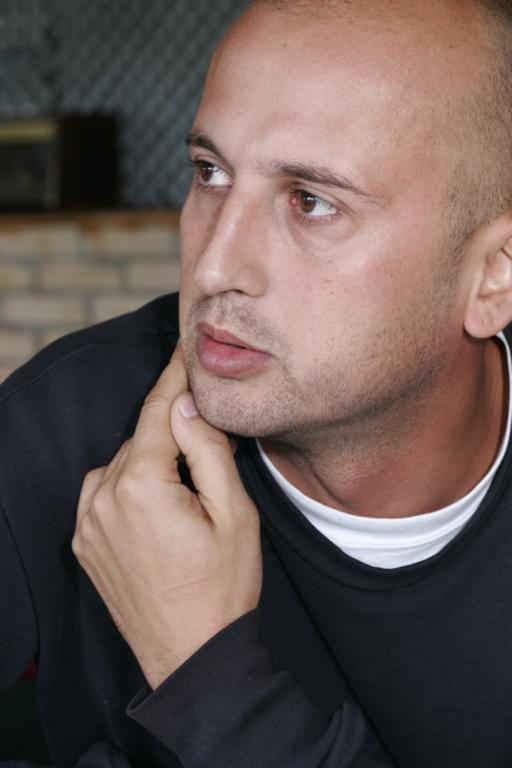
Seven days after the match against Belgium, a Fanaticos leader, Ismet ‘Ventola’ Turšić, who lives in Boras, Sweden, was invited to debate Ušanović on TV Hayat’s Central TV Bulletin. Another Fanaticos leader from Malme, Sweden, Davor ‘Bengal’ Ademović, came with Turšić to BiH, even as they faced mounting pressure to halt their criticism.
Ademović said that individuals from the association phoned them several times attempting to make a deal to prevent them from going to the media and drawing unwanted attention. ‘We were offered financial, call it a grant, to the two of us’ said Ademović. He did not want to specify the exact amount, but said that in convertible marks the bribe was a six-figure number.
Turšić concurred, saying, ‘Davor’s telephone rang. Munib (Ušanović) insisted that we should meet, that we not go to the TV station, to come to a mutual agreement, as he had put it. However, this was out of the question. You can see the results. If he had bought us then, we wouldn’t be raising Cain to this day.’
Ušanović said he could not remember whether he tried to get in touch with the Fanaticos prior to the show, but he was adamant he had not tried to bribe them.
‘That’s the most outrageous lie I have heard in my whole life’ he said. ‘I have not offered money to anyone.’
Meanwhile, the Fanaticos leaders say they received threatening phone calls and text messages. They have so far been unsuccessful in stopping Fanaticos’ protests against the association’s actions.
The Stunts to Draw Attention
Four days after the match in the Belgium, and three days before the face-off on the Hyatt program, the BiH national team played Lithuania at Sarajevo’s Koševo stadium. During that match, BH Fanaticos fans unfurled a banner on which they had written some of their criticisms of the association’s leaders: ‘Today the Association’s Stars – Tomorrow Behind Bars.’
The objective of this and other banners, said Fanaticos members, was to bring the problems of BiH football to the attention of the media, the Federation Internationale de Football Association (FIFA) and the Union of European Football Associations (UEFA). During the qualifier for the 2008 European Championship against Norway, on March 24, 2007, Fanaticos threw burning torches onto the field, causing a break in the game. The UEFA fined the association 36,000 Euros for that incident.
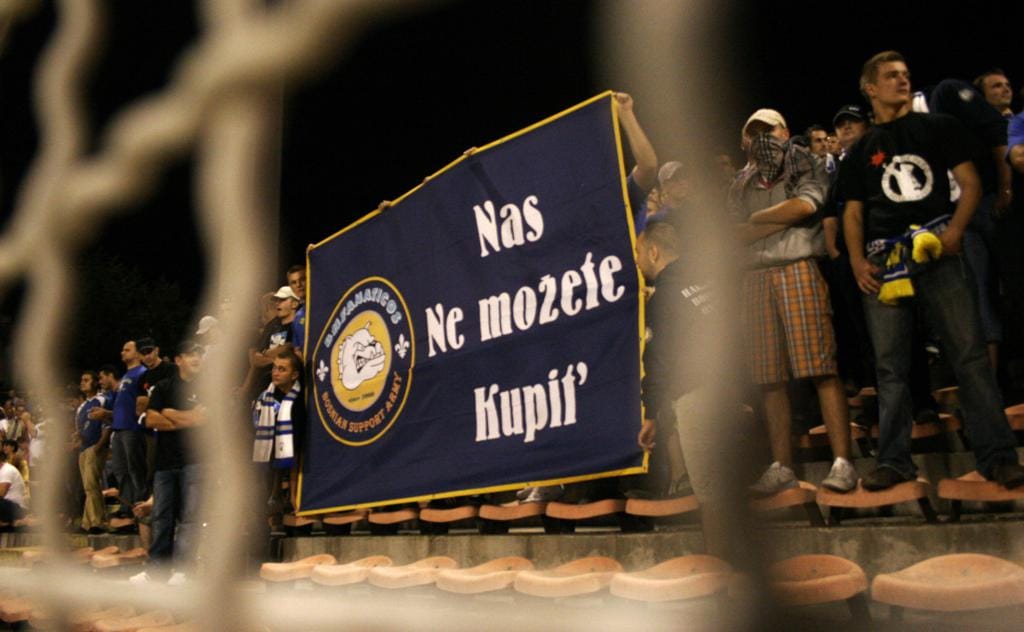
According to Bjorn Jensseter of the Norway police, who is the coordinator for international cooperation in football matters, the break lasted for 10 to 15 minutes, Bosnian fans caused no other problems, and nobody was arrested.
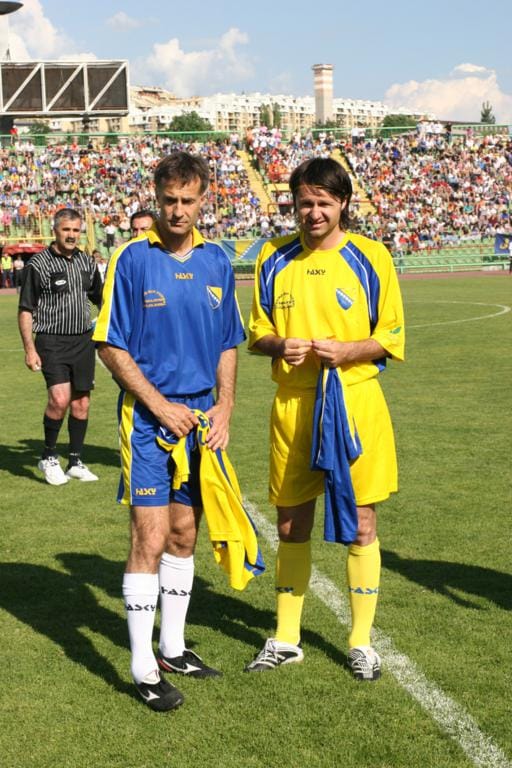
‘The idea was to capture as much attention as possible in Europe about the association’s work. Every fine paid by the association is something that weakens them and we support that’ Ademović said.
Along with other fan groups, the Fanaticos have taken up the cause of the abrupt dismissal of national team coach Meho Kodro and team manager, Elvir Bolić, in May 2008. Kodro and Bolić ran afoul of the leadership of the football association.
Resentment over the firings remains to this day. During a 4-1 win over Armenia in Zenica October.15, with the stadium full, fans cheered throughout the game: ‘Association, go away!’
Players who do not conform to the wishes of the association also have problems. The case of Glasgow Rangers’ defender Saša Papac shows how intent association officials are on deflecting any criticism. After Kodro and Bolić were sacked, Papac decided not to join the national team under the new coach, Miroslav ‘Ćiro’ Blažević.
The association went to FIFA about this, citing FIFA rules that a player who doesn’t respond to the invitation to play for the national team cannot play for his club in the following five days. Despite this, Papac played for Glasgow against Kilmarnock in the Scottish Championship.
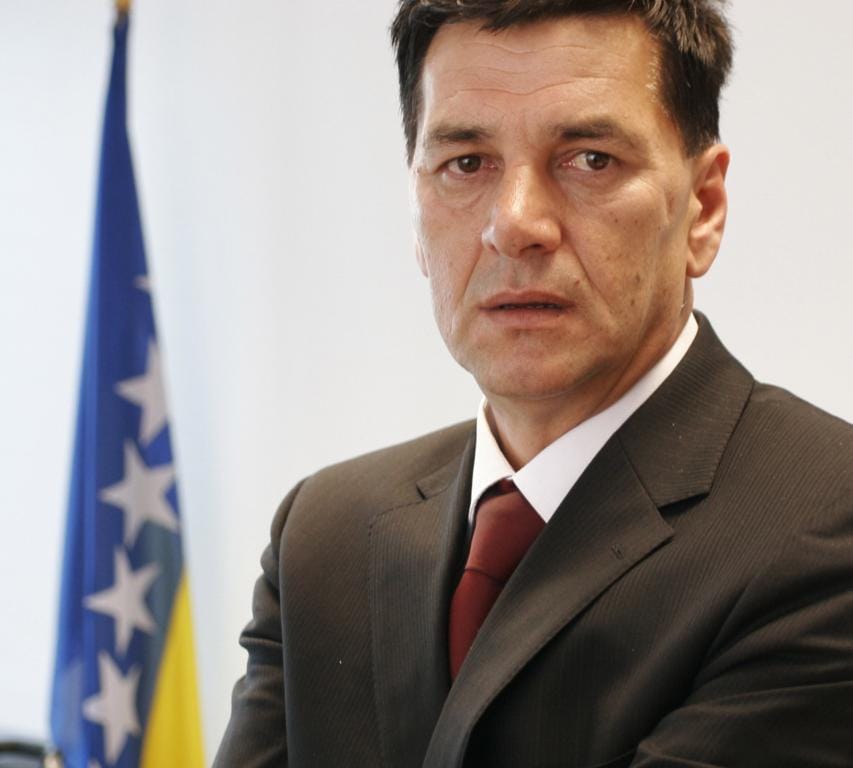
FIFA agreed with the association that the rule applied, but Glasgow Rangers spokesman Gillian McKelvie said FIFA never officially notified them. Papac, who declined to comment about the topic, subsequently sent a letter to association leaders saying he was not going to play for the national team in the future, in order to safeguard against possible future suspensions.
And there have been other recriminations at the Premiere League level. In 2005, Fuad Kasumović was forbidden to preside over the Zenica‘s Čelik club for a year because he had publicly criticized the leaders of the association.
‘I didn’t return after the suspension because the reasons for which I was suspended had not changed,” said Kasumović, who now works as a BiH deputy minister of finances and treasury. ‘The same people are holding the same offices. I simply let them indulge themselves in the pitch darkness of the tunnel into which they have pushed Bosnian football.’



